Throughout his career, Giuseppe Verdi considered numerous novels and plays by French, Italian, Spanish, and German writers as possible sources for operatic projects. He did contemplate setting several Shakespearean plays, including Hamlet, Cymbeline, Antony and Cleopatra, The Tempest, Romeo and Juliet, and King Lear, which in the end did not materialise.
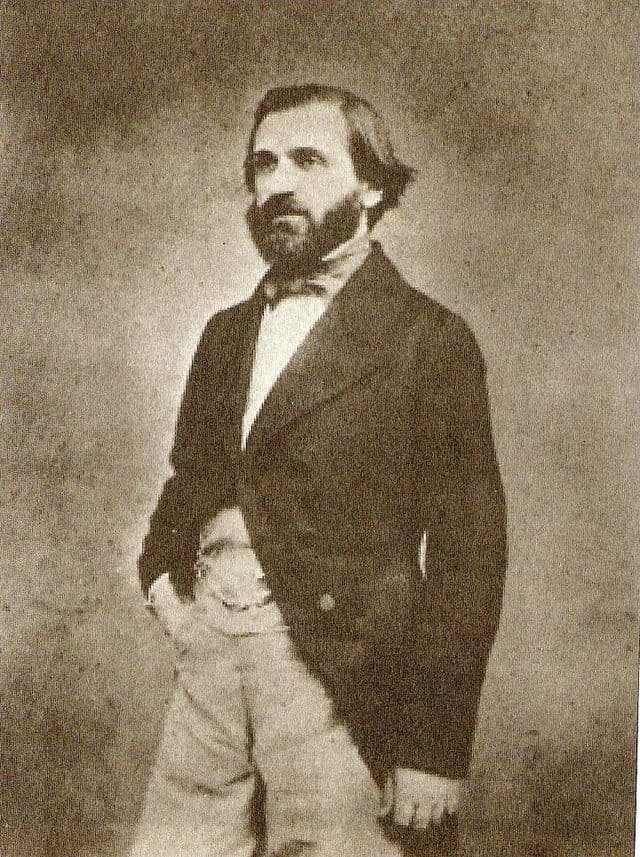
Giuseppe Verdi, 1844
However, the three Shakespeare operas Verdi did complete are decided masterpieces, with Macbeth premiering at the Teatro della Pergola in Florence on 14 March 1844.
Giuseppe Verdi: “Overture,” Macbeth
Verdi and Shakespeare
Throughout his life, Giuseppe Verdi was passionate about Shakespeare. As he exclaimed to a friend in 1865, “Shakespeare! Shakespeare is one of my favourite poets, whose works I have had in hand since my earliest youth, and whom I continue to read over and over.” In his first setting of a Shakespeare play, and his tenth opera Macbeth, he selected a tragedy practically unknown in Italy.
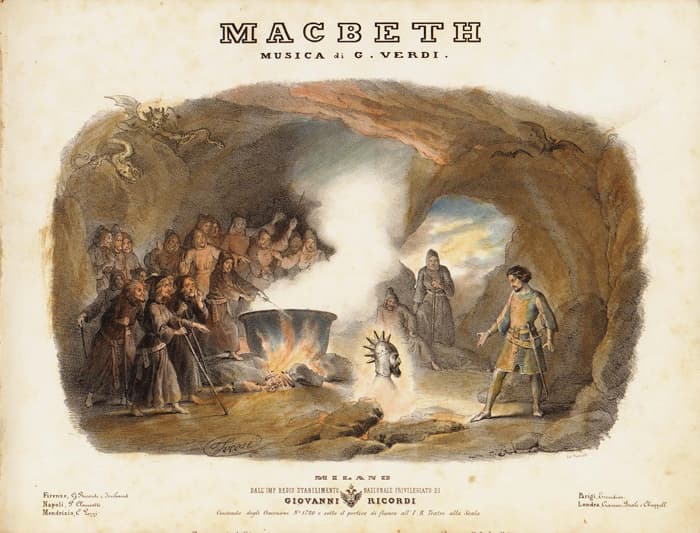
Macbeth meets the witches
Furthermore, he completely abandoned operatic conventions by forgoing a love story, and he assigns the title role to a baritone. “This tragedy is one of the greatest human creations,” he confided in his librettist Francesco Maria Piave.
Giuseppe Verdi: “Witches Chorus,” Macbeth
Verdi writes in his letter of dedication to Barezzi, “Macbeth I loved more than any of my other operas.” Verdi was determined to remain faithful to the Shakespearian original, as the emphasis fell on the authenticity of his adaptation. The issue of characterisation was particularly important to him, as he was adamant in his wish to create characters that had never before been seen or heard on the operatic stages of Italy.
Synopsis and Libretto
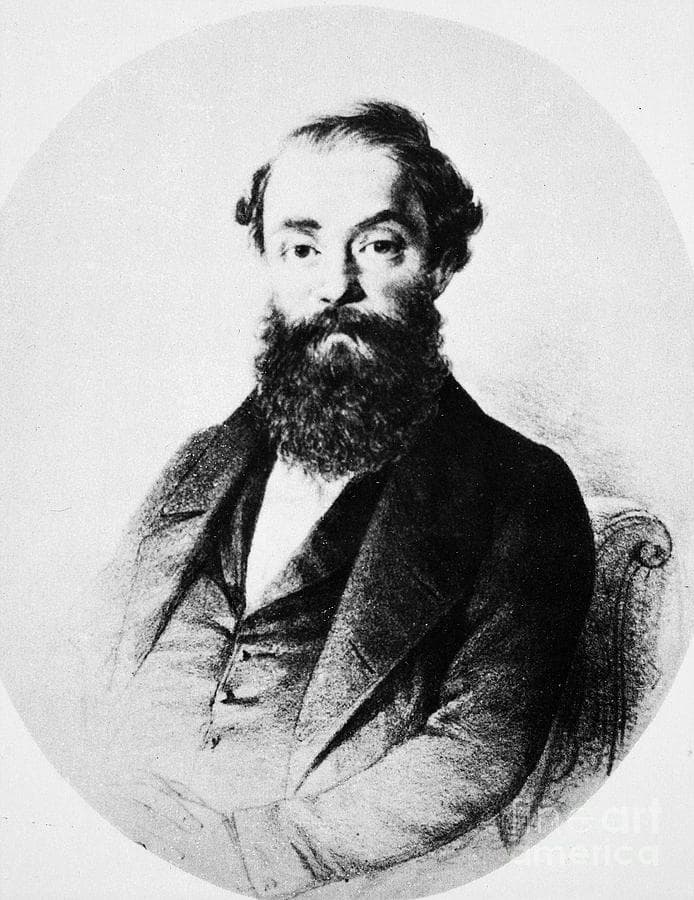
Francesco Maria Piave
Verdi went to work and fashioned the synopsis of the play himself. However, according to the composer, he did more than simply pen a synopsis. “I wrote a full prose version of the drama, showing the distribution of the acts, the scenes, the musical number.” He even provided Piave with specific details, such as the number of lines required for a particular cantabile or the number of syllables to the line for a particular chorus.
Giuseppe Verdi: “Duet Act 1,” Macbeth
Verdi proudly told Piave, “If we can’t make a great thing of it, then let us at least try to make a thing that is beyond conventional … brevity and sublimity!” As a scholar writes, “when we talk of the libretto of Macbeth we are then talking about something whose dramatic character and whose form were, down to the finest details, dictated by Verdi himself.” For some, the material was indecently daring for the time and world where the work was first performed. As a critic wrote, “Scottish fog, witches, ghosts, murder, darkness, and not the slightest love story to carry a resonant tune. And the composer of this ghastly thriller was a son of Italian sunshine!
Giuseppe Verdi: “Finale Act 1,” Macbeth
Plot
Macbeth and Banco run into a group of witches that proclaim that the former will be King of Scotland and the latter will have a long line of successors. Macbeth writes to his wife about a scheme to murder King Duncan, and the following day, Macbeth seizes the crown. However, he is paranoid about Banco’s part of the prophecy, and Lady Macbeth urges him to murder Banco and his son to prevent that prophecy from coming true. Banco is killed, but his son escapes.
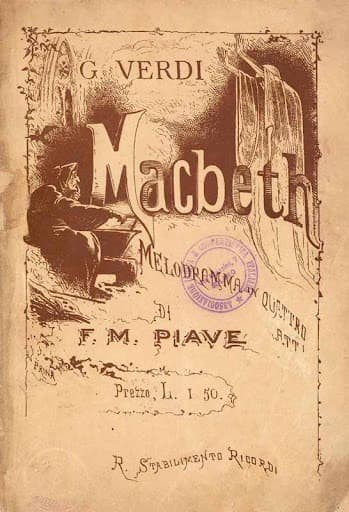
Giuseppe Verdi’s Libretto
At a celebration, guests are starting to question his legitimacy as king. He returns to the witches, asking for help. He sees three apparitions, with the first telling him to be aware of Macduff. The second tells him that he will not be harmed by a woman born of men, and the third tells him that he cannot be conquered. Then he is shown a vision of Banco’s ghost and his eight descendants, all Kings of Scotland. The Macbeths plot to murder everyone in their way. Lady Macbeth eventually goes insane and dies, while Macbeth ultimately loses in battle to Macduff, who was ripped from his mother’s womb and thus “not born of woman.” Banco’s son becomes king.
Giuseppe Verdi: “La luce langue,” Macbeth
The Revision
The audience was somewhat enthusiastic after the premiere in 1847, but critics were less enthralled, calling into question his respect for the Bard. Macbeth was frequently performed initially, but somewhat forgotten when Verdi scored some of his biggest successes with Rigoletto, Il trovatore, and La traviata in the early 1850’s. In 1864, the Théâtre-Lyrique in Paris sought to stage Macbeth in French. Verdi went to work and recomposed passages “which were either weak or, worse, lacking in character.”
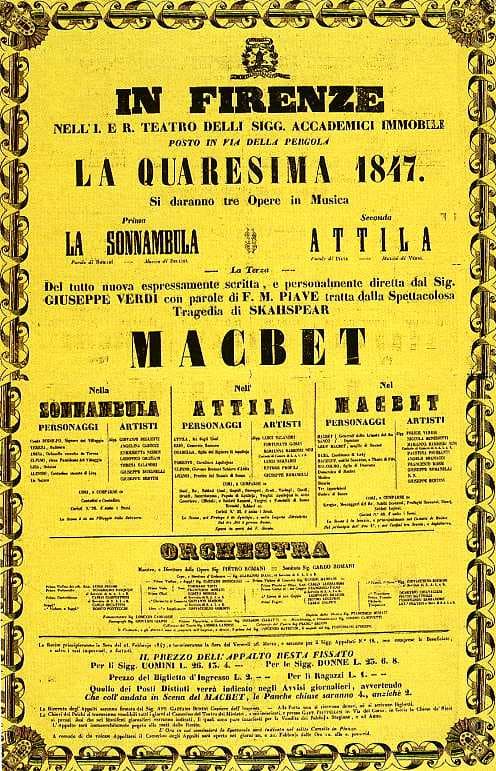
Premiere poster of Macbeth, 1847
The 1865 revision certainly enriches the score, supplying several of the most effective numbers, including the opening chorus of Act 4. A scholar writes, “Clearly the sense of stylistic disparity the revisions created did not concern Verdi; indeed, for the most part, he made little attempt to match the replacement numbers with the main body of the score, instead producing pieces that are among the most harmonically advanced of his later career.” More likely than not, you will hear the 1865 revision in performances today.
For more of the best in classical music, sign up for our E-Newsletter
